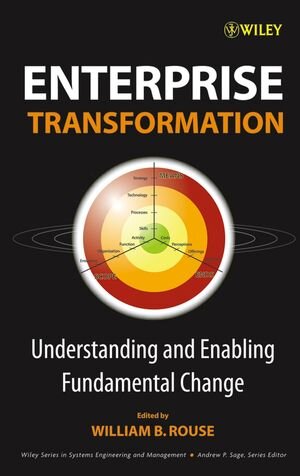
„... I commend the editor and contributors for creating a useful and timely collection of materials concerning transformation for students and managers.“ (Computing Reviews. com, September 18, 2006)
Enterprise Transformation
Understanding and Enabling Fundamental Change
herausgegeben von William B. RouseThis landmark book begins with the premise that an organizationmust often fundamentally transform its business practices andorganizational culture to fully align with and realize the value ofproduct and process innovations. The methods and practices that areset forth give readers the tools to create the essentialorganizational transformations needed to meet the challenges of acomplex, rapidly evolving global economy.
Enterprise Transformation is organized into four parts:
* Introduction to Transformation begins with an introduction andoverview of the book. It then features a systems-oriented view oftransformation as well as a theo-retical perspective on the forcesthat propel transformation and the nature in which transformationis pursued.
* Elements of Transformation addresses issues of transformationalleadership and organizational and cultural change. Next, itexamines transformation principles and case studies relevant tomanufacturing, logistics, services, research and development, enterprise computing, and quality management.
* Transformation Practices focuses on transformation planning andexecution, financing, bankruptcy, tax issues, public relations, andthe lessons learned from a variety of transformationexperiences.
* Transformation Case Studies features detailed studies of NewellRubbermaid, Reebok, Lockheed Martin, and Interface. This part alsoconsiders transformation in academia with an overview offundamental change at Georgia Tech. These case studies demonstratethe application of principles and practices and theirresults.
The authors of this contributed work are senior executives, leadingconsultants, and respected academics. Their experience in leadingenterprise transformation and supporting management teams isunparalleled. Managers and executives from all industries, as wellas business students, will learn about the critical tools needed totransform their organizations to keep pace with market demands andsurpass competitors.
Enterprise Transformation is organized into four parts:
* Introduction to Transformation begins with an introduction andoverview of the book. It then features a systems-oriented view oftransformation as well as a theo-retical perspective on the forcesthat propel transformation and the nature in which transformationis pursued.
* Elements of Transformation addresses issues of transformationalleadership and organizational and cultural change. Next, itexamines transformation principles and case studies relevant tomanufacturing, logistics, services, research and development, enterprise computing, and quality management.
* Transformation Practices focuses on transformation planning andexecution, financing, bankruptcy, tax issues, public relations, andthe lessons learned from a variety of transformationexperiences.
* Transformation Case Studies features detailed studies of NewellRubbermaid, Reebok, Lockheed Martin, and Interface. This part alsoconsiders transformation in academia with an overview offundamental change at Georgia Tech. These case studies demonstratethe application of principles and practices and theirresults.
The authors of this contributed work are senior executives, leadingconsultants, and respected academics. Their experience in leadingenterprise transformation and supporting management teams isunparalleled. Managers and executives from all industries, as wellas business students, will learn about the critical tools needed totransform their organizations to keep pace with market demands andsurpass competitors.






